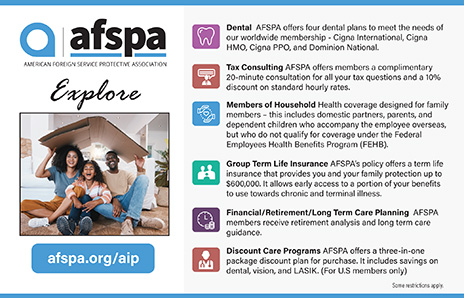Management Matters: New Tools for Middle Managers at State
The Bureau of Global Talent Management has new tools to improve management practices.
BY SARAH WARDWELL AND JEAN AKERS
Straight from the Source is the FSJ space for the foreign affairs agencies to inform the FS community about new policies or innovations in operations. Please send your feedback as letters to journal@afsa.org or comment on FSJ LinkedIn.
Being a good manager isn’t something that’s necessarily innate. It requires a set of skills that you develop over time—and these skills apply to any FS member in a supervisory position. You must be willing to take risks, make mistakes, learn from those mistakes, ask for feedback, be vulnerable, and keep trying. A study by Torch Leadership Labs shows that good managers can increase employee performance by 25 percent or more and retention by 40 percent.
The State Department has a low attrition rate historically—just 4.3 percent for career Foreign Service employees in Fiscal Year 2023, including retirements. But according to the 2022 Department Stay Survey and data from both exit surveys and exit interviews, poor supervisory practices are a top driver of regrettable attrition. In 2023 the department fell to 14 out of 17 in the Partnership for Public Service Best Places to Work rankings (which are calculated based on Federal Employment Viewpoint Surveys). These statistics highlight the tremendous opportunity the department has to increase engagement and satisfaction in our agency by improving the support offered to managers across the Service.
The up-or-out system of the Foreign Service encourages employees to move quickly from individual contributor to manager, perhaps before they fully understand what is expected of them as managers. In the absence of clear, consistent, and specific guidance, new managers wing it, often unsuccessfully, reverting to what worked well for them as an individual contributor and ultimately cementing bad habits over time. Recently, however, several new tools have been added to the Bureau of Global Talent Management’s resources available to all employees who want to improve their skills as managers.
Journey to Unleash Manager Potential
The Bureau of Global Talent Management (GTM) launched JUMP, the Journey to Unleash Manager Potential, in September 2024. This first-of-its-kind effort to support first-time and middle managers is based on extensive literature reviews, focus groups, survey data analysis, and ideas submitted to GTM’s Innovation Portal. JUMP offers a compendium of on-demand learning resources to enhance managerial skills—including a self-service, 360-degree feedback tool—and provides tips and tools to help managers more effectively use their time. Each component of JUMP was designed to meet a need directly articulated by the workforce.
JUMP support starts with a letter from the Deputy Secretary of State for Management and Resources (D-MR) outlining the department’s expectations of managers and providing links to all JUMP components. The letter sets both new and seasoned managers up for success by explaining their job requirements and outlining skills they should build throughout their career, taking into account both the leadership and management principles and the department’s core precepts for promotion. All managers—both new and experienced—are given a copy of that letter. It is not only a good reminder to more experienced managers but also a tool they can use with their own new managers as they coach them and help them craft their individual development plans (IDP).
[The JUMP letter] is not only a good reminder to more experienced managers but also a tool they can use with their own new managers as they coach them and help them craft their individual development plans.
The letter lists seven aspirational and functional expectations that are linked to a comprehensive compendium of curated training and learning opportunities that meet learners where they are, including Foreign Service Institute (FSI) classes, on-demand Percipio courses, AI simulators, articles from top business journals, videos, and podcasts. (See box below for a comprehensive list of resources.) JUMP resources are categorized both topically and thematically under these seven areas of focus to help make manager development straightforward and accessible. These resources can be used as part of the 40 hours of annual learning time endorsed by the department’s 2023 Learning Policy. GTM plans to expand this compendium of learning based on employee feedback.
360-Degree Feedback Tool
To design the LIFTool (Leveraging Individual Feedback Tool), team members from the Innovation Unit met with the developers of existing feedback tools and discovered a self-service, 360-degree feedback tool had been developed by Deputy Director to the American Institute of Taiwan Jeremy Cornforth and had already been tested with more than 100 colleagues. The GTM team used his tool as a base for theirs.
The LIFTool takes five minutes to use and can be deployed on demand. The manager selects just one area they want to work on from the list of areas outlined in the expectations letter. The manager can send a feedback request to any of their colleagues. Besides sending feedback to the manager, the tool will send the manager a series of nudge emails that include a few tailored learning resources to help develop their skills and knowledge in the selected area.
Feedback is anonymous and won’t be incorporated into any performance management or bidding considerations. It is up to managers themselves to act on the feedback they receive. FSI’s coaching program can also help managers integrate and act on this feedback.
Beyond JUMP
Managers across industries complain that administrative tasks—particularly meetings and emails—eat up time that could be spent engaging their teams. As therapist and writer Nedra Glover Tawwab says: “Efficiency and time management are excellent skills to learn, but when you have too much to do, they won’t help. Sometimes you need to unload your plate instead of making everything fit.”
According to the 2022 Department Stay Survey and data from both exit surveys and exit interviews, poor supervisory practices are a top driver of regrettable attrition.
To help managers take back their time, the Innovation Unit compiled resources from across the State Department, including a toolkit and game developed by Foreign Service Officer Amy Storrow, who completed an Una Chapman Cox sabbatical fellowship studying how to improve team meetings in the department. The Innovation Unit also created interactive tools that help managers shift the way they think about their time, including a meeting cost estimator to help managers reframe the value of their (and their colleagues’) time and a workload analyzer to visualize where their time goes.
JUMP is just one component of broader GTM efforts to develop and support managers, which include GTM’s popular “Managing Partner” newsletter, its quarterly webinar series “Aspiring Managers,” and the Manager Support Unit (MSU).
The Manager Support Unit
The MSU was launched in March 2020 with the mandate to offer supervisors real-time, practical advice on effectively managing and mitigating detrimental performance and conduct issues. Nearly five years later, the unit has provided advice to roughly 5,000 Foreign and Civil Service managers about more than 2,500 employee situations; conducted training and outreach to more than 12,000 managers and human resources professionals; and created an internal landing page with tools, resources, and templates that is accessed by dozens of department professionals each week.
MSU has evolved from a temporary office to a fully established division within GTM’s Office of Employee Relations that advises overseas and domestic managers on every type of conduct and performance issue. While the nature of cases fluctuates from month to month, one theme remains constant: Managers around the globe are eager for guidance. Most managers recognize the corrosive effect that poor performance and misconduct have when left unaddressed, and they’re looking for advice on how to tackle the issues and, ideally, correct the behavior.
Middle managers represent the bulk of supervisors who approach the MSU, but senior officials also seek support. Even the most seasoned managers encounter situations they’re not sure how to handle, and as they undertake challenging discussions with team members, they need support and affirmation—and they need to be sure they are acting in accordance with department guidance.
Nearly five years later, the unit has provided advice to roughly 5,000 Foreign and Civil Service managers about more than 2,500 employee situations.
After one call for advice in 2024, a manager wrote: “Since we spoke, I have had a series of difficult but productive conversations with the employee. … They want to improve, and I am now following up conversations in writing, which has been helpful. In addition to your suggestions, it was immensely helpful to learn that my situation is not uncommon and to receive your support in helping this employee succeed.”
In years past, many managers didn’t know where to turn for guidance, but feedback to the MSU indicates that’s no longer the case. At a recent workshop for deputy chiefs of mission and principal officers, nearly every participant raised their hand when asked if they’d heard of the MSU, and most confirmed they had consulted with the MSU on a personnel issue.
A Judgment-Free Zone
A phrase many participants in MSU training hear is: “The MSU is a judgment-free zone.” Holding employees accountable is one of the toughest things managers need to learn. MSU staff does not judge struggling managers. Instead, they see themselves as a pillar of support during difficult conversations.
The MSU’s unofficial tagline is: “Have you spoken with the employee?” This simple question conveys the fundamental responsibility of managers to their team members: to communicate expectations clearly, provide regular feedback on how an employee is doing, and let the employee know their manager supports their ongoing development. The good news is that MSU advisers are asking this question less frequently. Many managers seeking MSU support have already done initial counseling, and now they are looking for advice on next steps.
The Work Continues
JUMP was officially launched alongside the Retention Plan in September 2024. There’s still much to be done to help middle managers reach their full potential and shift the culture inside the department. GTM’s Innovation Unit is currently partnering with FSI to create a game that can help managers further develop their skills; FSI is piloting a new course to help first-time managers make the jump; and the department continues to increase the number of coaches available to provide individualized support.
The Innovation Unit is always looking for new ideas to support managers and our workforce, and it welcomes input through the Innovation Portal. Department employees have already submitted more than 3,800 ideas through the Innovation Portal, and a small team of Civil Service and Foreign Service staff within the unit reads and reviews every submission.
When sharing or linking to FSJ articles online, which we welcome and encourage, please be sure to cite the magazine (The Foreign Service Journal) and the month and year of publication. Please check the permissions page for further details.
JUMP into Manager Development is linked on the GTM intranet homepage. The following tools can be found at the JUMP link:
- Department Expectations of Managers: Letter to Managers. This letter outlines seven aspirational benchmarks and functional expectations for managers, and links directly to JUMP tools.
- Manager Learning Resources: Compendium of Learning Content. The compendium contains nearly 500 thematically organized resources for managerial growth and development.
- LIFTool. This automated, self-service tool helps managers seek feedback on a skill area they want to further develop and to obtain “nudges” of relevant learning materials in the months following their use of the tool.
- Meeting Cost Estimator. This interactive tool helps employees rethink who needs to be in a meeting and how often they need to hold it (or whether they need to hold it at all).
- Workload Analyzer. This interactive tool allows managers to evaluate how they are spending their time, highlighting whether they have enough capacity for essential managerial tasks like strategic planning, employee development, and self-improvement.
- Time Saving Tips. This suite of online resources helps managers reclaim their time.
- AI for Managers. Sample generative AI prompts to help managers become more effective and efficient.
Read More...
- “On the Education of Diplomats: A Commentary” by Paul M. Kattennurg, The Foreign Service Journal, April 1971
- “Needed: A Management Mindset” by Charity L. Boyette, The Foreign Service Journal, October 2020
- “A Look at the New Learning Policy: How, When, and Where Do State Department Employees Learn?” by Sarah Wardwell, The Foreign Service Journal, March 2024






